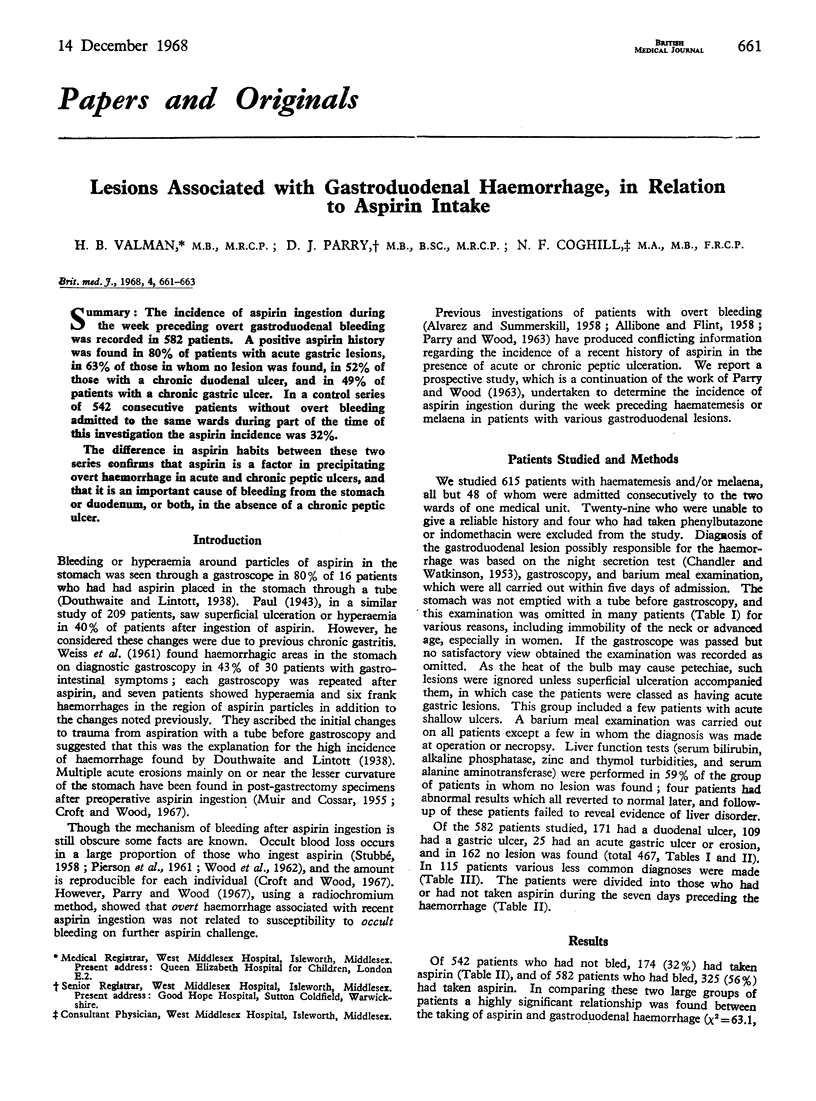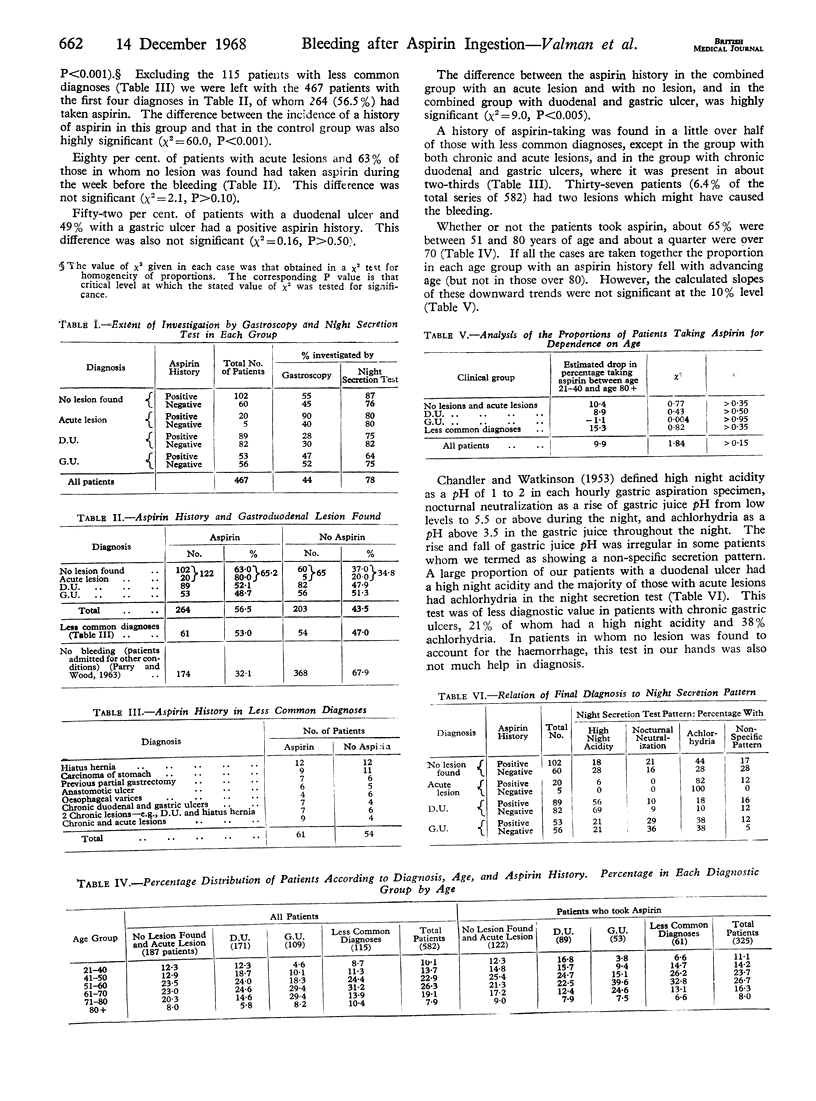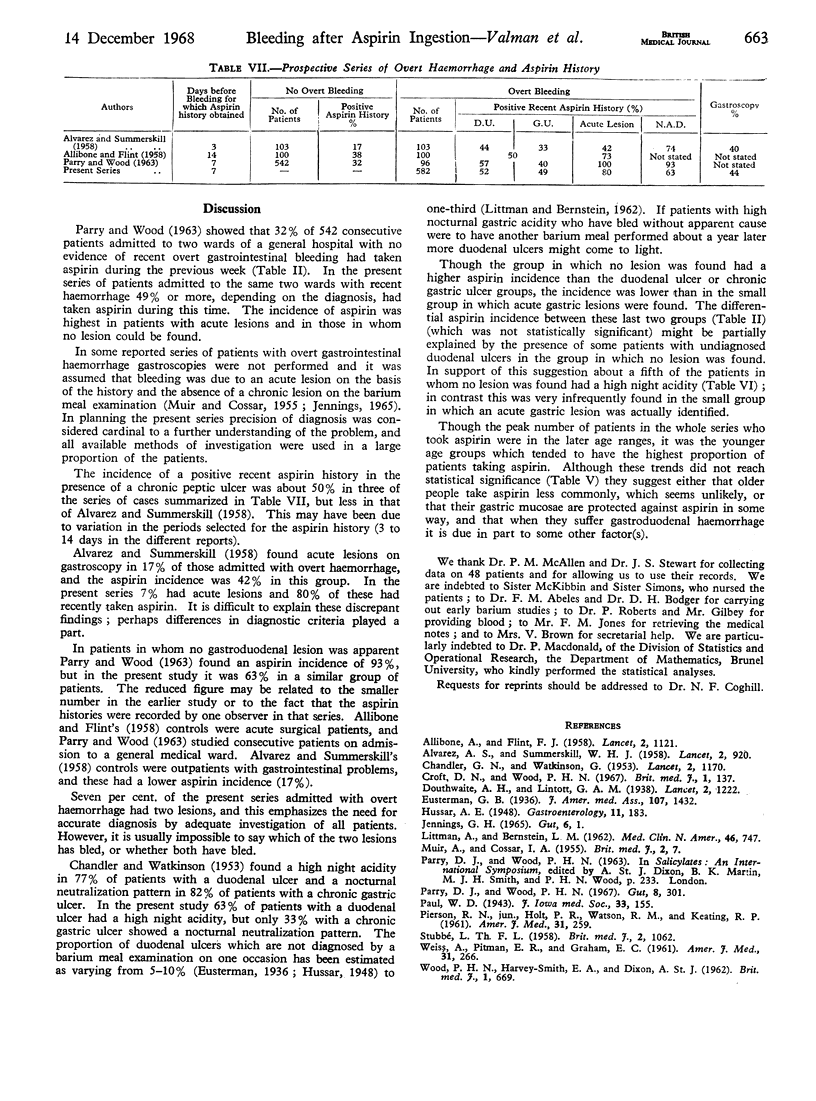Abstract
The incidence of aspirin ingestion during the week preceding overt gastroduodenal bleeding was recorded in 582 patients. A positive aspirin history was found in 80% of patients with acute gastric lesions, in 63% of those in whom no lesion was found, in 52% of those with a chronic duodenal ulcer, and in 49% of patients with a chronic gastric ulcer. In a control series of 542 consecutive patients without overt bleeding admitted to the same wards during part of the time of this investigation the aspirin incidence was 32%.
The difference in aspirin habits between these two series confirms that aspirin is a factor in precipitating overt haemorrhage in acute and chronic peptic ulcers, and that it is an important cause of bleeding from the stomach or duodenum, or both, in the absence of a chronic peptic ulcer.
Full text
PDF


Selected References
These references are in PubMed. This may not be the complete list of references from this article.
- ALVAREZ A. S., SUMMERSKILL W. H. Gastrointestinal haemorrhage and salicylates. Lancet. 1958 Nov 1;2(7053):920–925. doi: 10.1016/s0140-6736(58)90423-9. [DOI] [PubMed] [Google Scholar]
- CHANDLER G. N., WATKINSON G. Gastric aspiration in haematemesis. Lancet. 1953 Dec 5;265(6797):1170–1175. doi: 10.1016/s0140-6736(53)90726-0. [DOI] [PubMed] [Google Scholar]
- Croft D. N., Wood P. H. Gastric mucosa and susceptibility to occult gastrointestinal bleeding caused by aspirin. Br Med J. 1967 Jan 21;1(5533):137–141. doi: 10.1136/bmj.1.5533.137. [DOI] [PMC free article] [PubMed] [Google Scholar]
- JENNINGS G. H. CAUSAL INFLUENCES IN HAEMATEMESIS AND MELAENA. Gut. 1965 Feb;6:1–13. doi: 10.1136/gut.6.1.1. [DOI] [PMC free article] [PubMed] [Google Scholar]
- LITTMAN A., BERNSTEIN L. M. Clinical diagnosis in peptic ulcer and esophagitis. Med Clin North Am. 1962 May;46:747–755. doi: 10.1016/s0025-7125(16)33706-3. [DOI] [PubMed] [Google Scholar]
- MUIR A., COSSAR I. A. Aspirin and ulcer. Br Med J. 1955 Jul 2;2(4930):7–12. doi: 10.1136/bmj.2.4930.7. [DOI] [PMC free article] [PubMed] [Google Scholar]
- PIERSON R. N., Jr, HOLT P. R., WATSON R. M., KEATING R. P. Aspirin and gastrointestinal bleeding. Chromate blood loss studies. Am J Med. 1961 Aug;31:259–265. doi: 10.1016/0002-9343(61)90114-0. [DOI] [PubMed] [Google Scholar]
- Parry D. J., Wood P. H. Relationship between aspirin taking and gastroduodenal haemorrhage. Gut. 1967 Jun;8(3):301–307. doi: 10.1136/gut.8.3.301. [DOI] [PMC free article] [PubMed] [Google Scholar]
- WEISS A., PITMAN E. R., GRAHAM E. C. Aspirin and gastric bleeding. Gastroscopic observations, with review of literature. Am J Med. 1961 Aug;31:266–278. doi: 10.1016/0002-9343(61)90115-2. [DOI] [PubMed] [Google Scholar]
- WOOD P. H., HARVEY-SMITH E. A., DIXON A. S. Salicylates and gastrointestinal bleeding. Acetylsalicylic acid and aspirin derivatives. Br Med J. 1962 Mar 10;1(5279):669–675. doi: 10.1136/bmj.1.5279.669. [DOI] [PMC free article] [PubMed] [Google Scholar]


